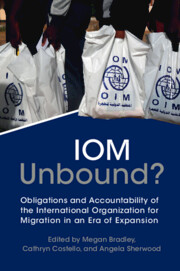In 2018, the United Nations concluded the first ever global agreement governing international migration, a move that speaks to the pressing need for more just, humane and effective governance of how people move across national borders. With the adoption of the Global Compact for Safe, Orderly and Regular Migration, the International Organization for Migration (IOM) assumed the lead agency role of coordinating the implementation of this agreement, placing it firmly and formally in a privileged and powerful position within the global governance of migration. Even prior to IOM’s new role, its reach and influence in the lives of people on the move, especially in the global south, was both immense and under-accounted for in literatures on international migration governance and administration. In my role as UN Special Rapporteur on Contemporary Forms of Racism, Racial Discrimination, Xenophobia and Related Intolerance, its influence on the day-to-day operation of borders around the world was palpable. In some places it provided life-giving aid to migrants in desperate situations, in others it formed part of the infrastructure of racialized border enforcement, and in yet others it played both roles. This volume makes a timely and much-needed contribution to our understanding of IOM and its complex and far-reaching mandate, and is a required reading for anyone interested in the present and future of international migration.
This volume makes a convincing case that IOM is at a ‘critical juncture’, with an increasingly visible operational and normative role in global migration governance. As this volume illuminates, IOM’s range of activities is wide and diverse. The contributors engage with obligations – legal, political, and ethical – and are situated in both international legal and international relations scholarship. Overall, they demonstrate that IOM (as other IOs) has a range of international legal obligations, and that in its activities it both integrates and transforms international standards, sometimes for the worse. They evocatively characterize its role as a norm ‘breaker, taker, and shaper’.
The volume reminds us of the ‘power and pathologies’ of international organizations. Some of the challenges identified are common across IOs, in particular the challenge of legal accountability. As the editors note in their powerful introduction:
[T]he notion that IOM has no obligations, particularly in relation to human rights and humanitarian norms, simply because it has sometimes failed to recognize and adhere to them, does not withstand scrutiny. This view also overlooks significant recent changes in IOM’s articulated commitments, policy frameworks, field operations and relationship to the UN system. This volume takes these commitments seriously, offering careful analysis and reconsideration of longstanding assumptions.
However, acknowledgement of commitments alone is never enough – accountability and oversight mechanisms are crucial. To this end, contributors examine a range of forms of accountability, including a careful assessment of IOM’s internal rules as a source of obligation, and assessment of IOM’s internal accountability mechanisms. Contributors demonstrate that IOM is now bound by the UN Human Rights Due Diligence Policy (HRDDP) and the principles underpinning it. While in general, contributors share the view that IOM is now clearer about its own human rights obligations, at least one contribution suggests that IOM has diluted its commitments in the 2016 Agreement whereby it acquired its ‘related status’ with the UN, challenging the assumed reading of that agreement. The chapters in Part II on ‘IOM in Action’ offer powerful insights into IOM’s practices and policies, across a range of diverse fields, including crisis operations; migration and climate change; data governance; ethical labour recruitment; humanitarian assistance; internal displacement; immigration detention; and ‘assisted voluntary return.’ As well as the range of empirical insights, the contributors also reveal how IOM engages with international legal standards across these diverse fields, often transforming or diluting them.
As wide ranging as this collection is, many of the practices highlighted suggest further critical perspectives that future scholarship and advocacy ought to explore. Indeed, one of the volume’s strengths is precisely that it prompts further reflection and many ideas for future research trajectories. At least one issue that requires greater attention is mapping more fully the role of IOM in remaking border regimes in the global south. Another is deepening our theoretical and normative understanding of how IOM’s work interplays with transnational border injustice, including racial injustice. Scholars, including Professor Bradley, have already begun to explore the historical imbrication of IOM and white settler migration, including to apartheid-era South Africa. This issue and the racialised exclusion embodied in many of the ‘migration management’ practices IOM has supported also warrants further examination and critique. Finally, before the institution can truly turn the page on its past, the questions of compensation and reparation for the practices it has enabled must be addressed. Serious questions remain regarding how best to hold IOM accountable for its role in human rights violations and other injustices, and what it would mean (and whether it is possible) to remake it in a manner that advances genuinely just and humane borders.
International law on migration reflects a capacious conception of state sovereignty, that in turn enables states to ignore their ethical and political obligations to outsiders. This conception of sovereignty is written into IOM’s constitutional DNA, in its remarkably deferential stance to state sovereignty over migration control. To the extent that this historically contingent and deeply problematic conception of statehood itself needs a fundamental rethink, in particular in order to repair colonial injustices, IOM too needs, at the very least, radical reform at the level of its Constitution. While the editors conclude with a reform agenda, I might push them and other scholars further to consider in future work, what an abolitionist praxis might mean and do where IOM is concerned. This volume, however, makes a truly powerful contribution to the diverse and even competing perspectives on IOM’s future by providing an informed foundation from which to engage.

